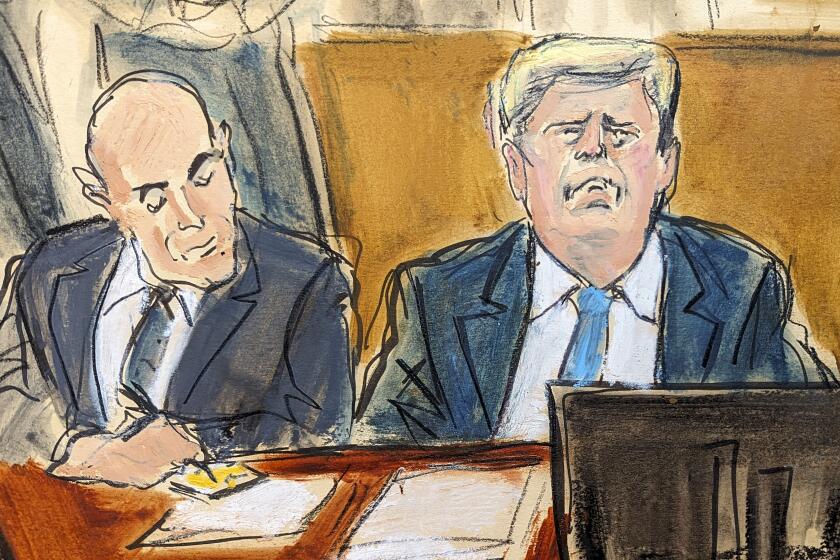Problems Persist at Veterans Home, Lawmakers Told
Sixteen months after losing its certification because of poor patient care and sloppy management, the state nursing home for military veterans in Barstow is still plagued by many of the same problems, a team of private nursing home experts has concluded.
That assessment from a company hired by the state to temporarily manage the nursing home and qualify it for recertification by the federal government came as an unpleasant surprise at a legislative hearing last week.
“I’m alarmed,” said state Sen. Wesley Chesbro (D-Arcata), an advocate of veterans’ interests and chairman of a Senate budget subcommittee that is investigating fiscal issues at the state Department of Veterans Affairs, including the Barstow home.
“The testimony we heard ran contrary to what we have been told by the department regarding the prospects for recertification.”
Among other things, representatives of Country Villa Health Services testified that serious issues are unresolved at the 5-year-old facility.
The state Department of Health Services, which licenses nursing homes in California, is expected to announce its preliminary recommendation on recertification as early as Monday.
The decertification has caused a number of problems. The still vacant new veterans nursing home in Chula Vista cannot accept patients until the Barstow facility is recertified.
If the Barstow home receives a favorable rating, it will face another inspection within 120 days. A second positive finding would result in restoration of its certification and restart the flow of millions of dollars in Medicare and Medi-Cal aid.
“I feel very positive about recertification,” said Veterans Affairs Secretary Bruce Thiesen, whom Gov. Gray Davis appointed to the cabinet-level position Wednesday.
The post had been vacant since May 2000, when Tomas Alvardo resigned after the controversial death of a 76-year-old veteran who choked on his lunch at the Barstow home.
A series of unannounced investigations at the home in spring 2000 uncovered case after case of poor patient care, dispensing of unapproved drugs, missing and misfiled medical records, and a constant turnover of management executives and staff health workers.
A U.S. Department of Veterans Affairs decision to withdraw its approval of the home cost the facility $5 million in Medicare and Medi-Cal payments during the last year.
Davis and the Legislature had to offset that loss by dipping into state tax revenues, a process that continues.
At the sprawling campus of the California Veterans Home in Barstow, the recently downsized skilled-nursing facility can house 160 patients, but has only 86 now. It has admitted no new patients since decertification.
The veterans complex also is home to 105 residents assigned to independent-living quarters and 17 residents who are in assisted-care housing for the elderly. Their federal payments were not affected by decertification of the nursing home.
The Barstow facility has been troubled virtually since the day it opened in 1996. Fearing that it could not correct its problems unassisted, state officials last year hired Country Villa, a reputable operator of 30 nursing homes, to act as temporary manager and impose changes that would enable the facility to regain its federal approval.
State Veterans Affairs officials had expressed confidence that the home was making progress under Country Villa in overcoming its problems and that recertification would be a virtual certainty.
But at the budget subcommittee session last week at the California Veterans Home in Yountville, Eldon Teper, chief operating officer of Country Villa, and Wayne Grigsby, a vice president, delivered a downbeat assessment of the progress in Barstow.
They cited a long list of shortcomings, including what they said was a failure to discipline nurses who are chronically late for work or do not show up at all; an inability of health workers to make swift decisions on urgent patient-care issues; and the facility’s failure to hire and retain experienced nursing home employees.
Teper testified that the Barstow home lacked what he called a “culture of compliance” that he said must be obeyed if the fundamentals of patient care, decision-making, accountability and clear communications are to be met.
“As we left the veterans home at Barstow on Oct. 31, I do not believe that the culture of compliance exists,” Teper testified.
He said that he found that no one at the home would accept responsibility for the troubles. Teper said he never heard anybody concede that “we messed up. We are going to do better. We are going to learn our lessons and put our best foot forward.”
Teper added: “We never really felt confident that the urgency of patient care” was the highest priority.
Another discouraging assessment came from Brenda Klutz, the Health Department’s powerful chief regulator of nursing homes, who has heavily fined the Barstow home in the past and is involved in its recertification effort.
In response to Chesbro’s questions, Klutz said she had “sincere hopes” that long-lasting reforms would be maintained at the facility, “[but] based on my experience, I do have some concerns.”
Chesbro invited state Veterans Affairs officials to respond, but they declined, saying they would file a written statement later.
On Friday, Thiesen, the new Veterans Affairs secretary, said he could understand Klutz’s unspecified concerns about recertification. “There were some very grave issues at the Department of Health Services when we became decertified,” and they may linger, he said.
Thiesen said Country Villa did a “good job,” but its evaluators may not have been familiar with the unusual operating structure at the Barstow home. He said it operates with a staff of round-the-clock physicians, whereas private homes typically do not employ staff doctors.
He characterized Barstow as a combination nursing home and medical facility that cannot easily be evaluated by consultants experienced only in surveying private nursing homes.
Likewise, he said, protective civil service rules for state employees at the Barstow home differ greatly from rules covering nurses and other health workers in private nursing homes.
“If we had somebody not performing to the standards we’d like, we immediately cannot fire them as they can in the private sector,” Thiesen said. “These are civil servants. We just cannot lay somebody off.”
More to Read
Start your day right
Sign up for Essential California for news, features and recommendations from the L.A. Times and beyond in your inbox six days a week.
You may occasionally receive promotional content from the Los Angeles Times.






